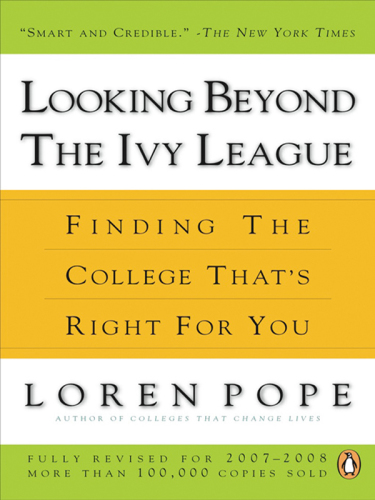
Looking Beyond the Ivy League
Finding the College That's Right for You
کتاب های مرتبط
- اطلاعات
- نقد و بررسی
- دیدگاه کاربران
نقد و بررسی

March 15, 1990
If students use size, name, and prestige as the sole criteria for choosing a college, then they may be limiting their opportunities of finding a college that is right for them, says veteran college counselor Pope, director of the College Placement Bureau. Pope shares his "personal favorite" colleges and 200 other colleges worth considering because they provide a good experience and help students shape their futures. Chapter-length discussions deal with enhancing high school preparation, improving the attractiveness of the applicant and application, and more. Though similar to Richard Moll's The Public Ivys (Penguin, 1986) and Martin Nemko's How To Get an Ivy League Education at a State University (Avon, 1988), Pope's book covers a wider range of size and caliber than either of those, and therefore is more useful for students of varying academic goals and abilities. Well written, clear, and direct, this is enthusiastically recommended for high school, public, and community college libraries.-- Francine M. DeFranco, St. John's Univ. Lib., Staten Island, New York
Copyright 1990 Library Journal, LLC Used with permission.

July 1, 1990
Gr 10 Up -An authoritative, carefully expressed argument for aiming at a small liberal-arts college rather than a large, impersonal university. Pope claims that there is "a lot of non-Ivy quality available" for many kinds of students, and describes several colleges and programs to back up his points. This information, however, is limited. He describes ways in which learning-disabled students or low high-school achievers can obtain a college education, and includes sensible advice on the application/selection process and financial aid. Although some may justifiably argue that the picture of large universities isn't always quite as glum as he paints, Pope's recommendations and concerns are usually on target. His style is not upbeat like many guides of this type, such as Edward B. Fiske's How to Get into the Right College (Times, 1988), but it is practical and filled with wisdom and good examples. Students who are as interested in the social scene or extracurricular activities as they are in academics will not find the book as useful as those students primarily concerned with serious learning. -Diane P. Tuccillo, Mesa Public Library, AZ

























دیدگاه کاربران